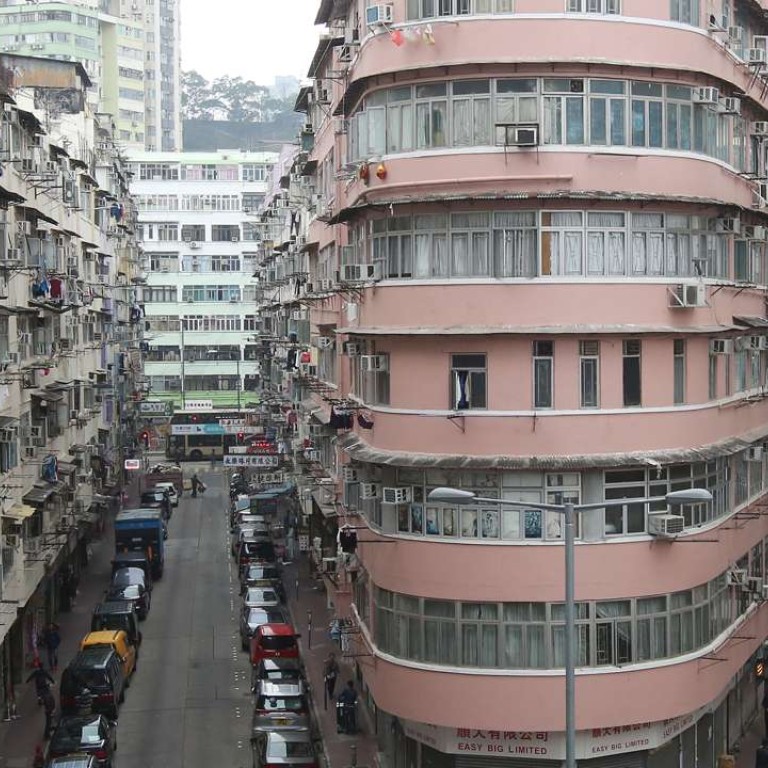
Squeezed out: Under-fire HK developers seek redevelopment value in old properties
Mainland developers snapped up about 30 per cent of all the government sites sold last year, property consultant Cushman & Wakefield says. Statistics indicate their share in the land market was about 40 per cent by value.
Local property developers are increasingly setting their sights on buying old properties for redevelopment value as they get priced out of land auctions by mainland competitors.
Cash-rich mainland property companies have paid huge premiums at land auctions since last year as they muscle their way into a crowded property market.
According to statistics compiled by property consultant Cushman & Wakefield, about 30 per cent of all the government sites sold last year were snapped up by mainland developers. The statistics indicate that their share in the land market was about 40 per cent by value.
Developers’ interest in redevelopment sites before last year was somehow distracted by the increased supply of government sites on the open market.

He adds that his firm has received more inquiries from local developers about the availability of “mature” redevelopment sites in recent months.
Last year, there were about a dozen forced auctions through which developers unified the ownership of sites earmarked for redevelopment. Yet, since it can often take years for one to acquire the majority stake, it is expected that the number of compulsory sales will rise in the medium-term future.
Last month, Henderson Land successfully acquired the remaining ownership of an old building at Yiu Tung Street, Sham Shui Po, which has approximately 20,475 sq ft of developable floor space, for about HK$100 million at a forced auction it triggered.
It is also acquiring properties on plots at the nearby Nam Cheong Street and Berwick Street, which will likely be combined with the Yiu Tung Street site into a larger site for a mixed-use development.
Henderson Land has about 39 redevelopment sites across the urban area. In these sites it has acquired at least 80 per cent of ownership.
Together they will add about 3.8 million sq ft of gross floor area to its development pipeline, according to the company’s annual report.
“Pursuing a redevelopment project can’t be done overnight. It takes a great deal of strategy and effort, from identifying a potential redevelopment site and carrying out due diligence on the titles, which are often very complex, to negotiations with the owners and closing the en-bloc deal,” Hui says.
Purchasing a redevelopment site is the most time-consuming, resource-intensive way for a property developer, experts say.
The acquisition process often involves buying the units, one by one, in the target building, or a “tong lau”, that occupies a lot with redevelopment values.
As a rule of thumb, redevelopment value is the increase in real estate value after a change in use. Also, the more extra gross floor area the developer can gain after redeveloping an existing building that has not fully utilised the permissible gross floor area, the more profitable the project is supposed to be for the developers.
To claim full ownership of a redevelopment site, the developer has to secure at least 80 per cent of the building’s ownership, known as undivided shares. The developer holding the majority of the lot can make an application to the Lands Tribunal for a forced auction in order to buy out the rest of the ownership.
Owing to the considerable amount of knowledge, effort and patience needed during the lengthy acquisition process, redevelopment activities, except those led by the URA, remain a sweaty game for seasoned local players, at least up until this point.
There are certain prerequisites that have to be met before considering a redevelopment site.
“Developers prefer a site on which at least 80 per cent of owners agree to a collective sale. It can’t be too small, too, ideally a site area bigger than 5,000 sq ft.
Of course, the real estate value after redevelopment must allow for a reasonable profit after deducting the development costs, taxes, agency and consultant fees, and potential legal costs,” Hui says.
A number of new or smaller developers have resorted to buying tong laus for redevelopment as they can’t afford to bid against bigger property developers.

Other developers, including Kerry Properties, have recently suggested they might seek to acquire redevelopment sites as a way to restock
their land bank in the face of a more competitive
land market.
While it is true that their interest in redevelopment sites has strengthened, availability of urban land with good redevelopment values is very limited, says Charles Chan, managing director of valuation and professional services at Savills.
Some more sought-after old buildings are also being “held for ransom” by speculative purchasers, who deliberately bought 20 per cent of ownership. There are further legal risks and potential litigation costs to take into account in case disputes with small owners have to be settled through expensive lawsuits, Chan adds.
